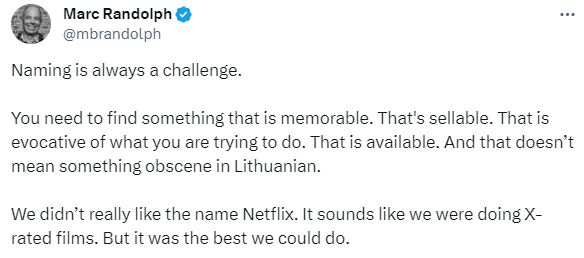In the vast and ever-expanding realm of business, one of the most critical yet often underestimated challenges lies in the art of naming. A name is not merely a word; it encapsulates an identity, a vision, and a brand. Recently, Netflix Co-Founder Marc Randolph (@mbrandolph) shared a profound nugget of wisdom on Twitter, shedding light on the intricate process of naming a venture.

In his tweet, Randolph emphasized the multifaceted nature of naming, stating, “Naming is always a challenge. You need to find something that is memorable. That’s sellable. That is evocative of what you are trying to do. That is available. And that doesn’t mean something obscene in Lithuanian.” This seemingly simple statement unravels the complexities entrepreneurs face while christening their brainchild.
Netflix, now a household name synonymous with streaming entertainment, was not the original choice of its founders. Randolph candidly admitted, “We didn’t really like the name Netflix. It sounds like we were doing X-rated films. But it was the best we could do.” This revelation underscores the struggle businesses often endure in striking a balance between descriptiveness and marketability. The name must resonate with the core values of the enterprise without misrepresenting its essence.
Randolph’s tweet also opens a window into the past, a time when the internet was in its infancy. In 1996, when Netflix was taking its initial steps, domain names were not only vital but also incredibly scarce. Companies needed to devise creative strategies to secure a domain that mirrored their brand. Randolph’s notepad, a relic from that era, likely tells a tale of brainstorming sessions and countless iterations, each aimed at finding the perfect domain name.

The significance of domain name strategies in the mid-90s cannot be overstated. Internet usage was growing at an unprecedented rate, and businesses were rapidly realizing the potential of an online presence. Securing a relevant and easy-to-remember domain name was akin to claiming a piece of virtual real estate. It became an integral part of branding, marketing, and overall business identity.
Randolph’s revelation about Netflix’s less-than-ideal name sheds light on the challenges entrepreneurs faced during this period. The chosen name had to be not only catchy but also translate seamlessly into a web address. Companies had to adapt their names to fit the limited character space allowed by domain registrars, a feat that required both creativity and precision.
Fast forward to the present day, where the internet landscape has evolved but the essence of naming remains unchanged. Startups and established businesses alike grapple with the same challenges Randolph highlighted in his tweet. The process of naming, as he succinctly put it, remains a quest for something memorable, sellable, and reflective of the brand’s identity.
Marc Randolph’s tweet serves as a poignant reminder of the intricacies involved in naming a venture. It not only encapsulates the essence of naming challenges but also provides a glimpse into the past when securing a suitable domain name was a testament to a company’s foresight and adaptability. In an era where digital presence is paramount, Randolph’s insights echo louder than ever, resonating with entrepreneurs navigating the complex terrain of branding and online identity.
To your domaining success,
@AndrewHazen & @DomainSuccess






